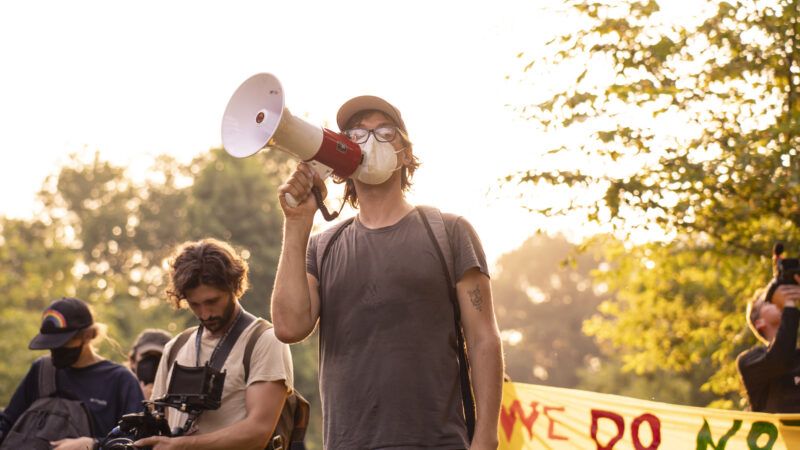Georgia Charges 'Cop City' Protesters Under RICO Law Used To Indict Trump
Among the indicted are a Southern Poverty Law Center attorney acting as a legal observer and three people who run a bail fund.

Activists have spent two years protesting the construction of a police training center southeast of Atlanta. The city plans to build the facility, which protesters have dubbed "Cop City," on state-owned forested land, and activists have resorted to various tactics—including, in some cases, violence—in opposition.
This week, Georgia Attorney General Chris Carr announced charges for 61 protesters under the state's Racketeering Influenced and Corrupt Organizations (RICO) Act. The indictment claims the defendants are all part of a criminal enterprise called Defend the Atlanta Forest. Included among the indicted defendants are a Southern Poverty Law Center attorney who was arrested while acting as a legal observer and three people who run a bail fund.
The indictments come less than a month after Fulton County District Attorney Fani Willis charged former President Donald Trump and 18 co-defendants under the same law; in fact, as the Atlanta Journal-Constitution reported, the same grand jury that issued the indictments against Trump was also involved in the indictments against Cop City protesters. While Willis' use of the statute against Trump was overly broad and likely criminalized constitutionally protected speech, the state's charges against protesters could be even worse.
According to the indictment, Defend the Atlanta Forest is "a self-identified coalition and enterprise of militant anarchists, eco-activists, and community organizers" and an "anarchist, anti-police, and environmental activism organization." The filing even defines anarchy, which it calls "a philosophy that is opposed to forms of authority or hierarchy" that "primarily targets government because it views government as unnecessarily oppressive." It then goes on to define terms like collectivism, mutual aid, and social solidarity as "major ideas that anarchists promote."
"Instead of relying on a modicum of government structure, anarchy relies on human association instead of government to fulfill all human needs," it continues. "Anarchists often point to law enforcement as one of the chief violent actors, and they accuse the government of using law enforcement to oppress societal change, and they view the structure of government as inherently oppressive and violent."
In this case, activists cite one incident in particular: the January shooting death of Manuel "Tortuguita" Paez Terán, a protester, by law enforcement. At the time, state officials claimed the protester had shot a state trooper and was killed when other officers returned fire. But the official autopsy found no gunpowder residue on Paez Terán's hands.
To say that the indictment paints with a broad brush is an understatement. Prosecutors speak about "militant anarchists" and their tactics but also spend a considerable amount of time describing conduct that is clearly protected speech. "Defend the Atlanta Forest anarchists target and recruit individuals with a certain personal profile," the filing alleges. "Once these individuals have been recruited, members of Defend the Atlanta Forest also promote anarchist ideas through written documents and word of mouth;" such documents "decry capitalism in any form, condemn government, and cast all law enforcement as violent murderers." (All protected speech.)
Some protesters may have committed offenses deserving of prosecution. The indictment alleges a number of violent acts, such as destroying construction equipment and one allegation of "punch[ing] a police officer." Five protesters are charged for burning a police car and destroying private property. But much of the rest of the indictment relies on guilt by association to tie dozens of protesters to a criminal conspiracy, stretching the state's RICO statute past its logical breaking point.
"We are extremely concerned by this breathtakingly broad and unprecedented use of state terrorism, anti-racketeering, and money laundering laws against protesters," said Aamra Ahmad, an attorney with the American Civil Liberties Union, in a statement. "Georgia law enforcement officials are disproportionately wielding these overbroad laws to stigmatize and target those who disagree with the government."


Show Comments (50)